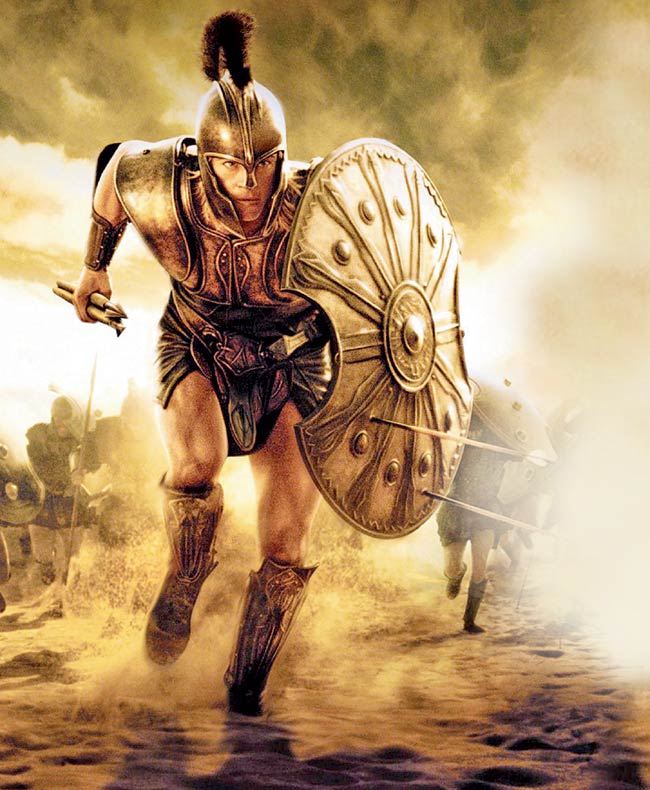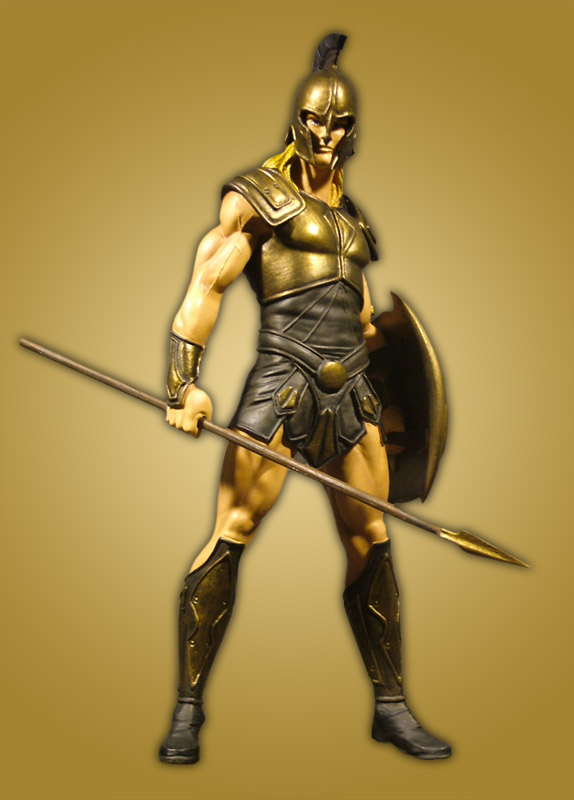Achilles: The Trojan War Hero - His Story & "Achilles' Heel"
Did a hero truly live, a being of unmatched strength and fury, capable of feats that defied human limits, yet ultimately undone by a single, vulnerable point? The legend of Achilles, the greatest warrior of the Greeks, remains a timeless testament to the complexities of heroism, a narrative that explores the price of glory and the inescapable grip of fate.
From the sun-drenched plains of Troy to the shimmering shores where his divine mother, Thetis, first dipped him into the waters of immortality, Achilles's story resonates through the ages. This article delves into the life, death, and enduring legacy of this iconic figure, examining the myriad interpretations of his tale and its impact on art, literature, and our understanding of the human condition. We will explore his early life, his relationship with Patroclus, his legendary rage, and the circumstances surrounding his demise, all while examining the historical and cultural context that shaped his mythic persona.
| Aspect | Details |
|---|---|
| Full Name | Achilles (, Akhilles) |
| Parents | Peleus (mortal king of the Myrmidons) and Thetis (a sea nymph, daughter of Nereus) |
| Birthplace | Phthia, Thessaly |
| Key Attributes | Invincible (except for his heel), incredibly strong, swift, and a skilled warrior. Known for his wrath and pride. |
| Role in the Trojan War | Leading warrior of the Achaean (Greek) army. Commander of the Myrmidons. |
| Notable Deeds | Slaying Hector, sacking numerous cities, and his central role in the Iliad. |
| Death | Killed by Paris with an arrow to the heel. |
| Legacy | Symbol of heroism, warrior prowess, and the concept of an "Achilles' heel" (a fatal flaw). |
| Literary Significance | Central character in Homer's Iliad, a cornerstone of Western literature. |
| Associated Terms | Myrmidon, Peleides ("son of Peleus"), Aeacides (descendant of Aeacus) |
| Related Mythological Figures | Patroclus, Hector, Agamemnon, Thetis, Peleus |
| Reference | Britannica - Achilles |
Achilles's origins are shrouded in myth and legend. His parents, the mortal King Peleus and the sea nymph Thetis, represent a union of the earthly and divine realms. Thetis, a daughter of the sea god Nereus, possessed a power that made her a highly sought-after bride. Both Zeus and Poseidon, the king of the gods and the god of the sea respectively, vied for her hand, but a prophecy foretold that any son born of Thetis would be greater than his father, leading them to reconsider their pursuits. They ultimately arranged for her marriage to the mortal Peleus. This union, although less powerful than the divine options, was destined to produce the greatest warrior of all time.
Before the Trojan War, Thetis attempted to make Achilles immortal. Several accounts exist, with the most common involving dipping him in the River Styx, a river that separated the world of the living from the underworld. She held him by the heel, which remained vulnerable, the only part of his body that was not touched by the divine waters. Other versions suggest Thetis placed him in fire to burn away his mortal aspects. Regardless of the specific method, the goal was the same: to grant Achilles invulnerability.
Raised in Phthia, Thessaly, Achilles was trained by the centaur Chiron, renowned for his wisdom and skill in the arts of war and healing. Chiron instilled in him a deep understanding of combat and the responsibilities of a leader. Even as a young man, Achilles was destined for greatness, with his strength and prowess quickly becoming legendary. However, his fate was also foretold; he would be given a choice: a long, uneventful life or a short, glorious one. The latter choice, laden with both fame and an early death, was the path he ultimately embraced.
The Iliad chronicles the climax of the Trojan War, focusing on Achilles's rage (mnis) and its devastating consequences. The conflict begins with Agamemnon, the leader of the Greek forces, taking Achilles's prize of war, the woman Briseis. Insulted and embittered, Achilles withdraws from the fighting, leaving the Achaean army to suffer heavy losses. His absence allows the Trojans, led by the valiant Hector, to gain the upper hand. This decision is a turning point in the epic, highlighting the destructive power of pride and the importance of forgiveness.
The relationship between Achilles and Patroclus forms a critical element of the narrative. Patroclus, Achilles's closest companion, is portrayed as a figure of deep affection and loyalty. Homer's Iliad offers a complex depiction of their bond. When Patroclus is killed by Hector, the depth of Achilles's grief is profound, igniting his fury and driving him back into battle. He mourns his beloved companion and the death of this comrade propels him to seek revenge.
Achilless grief, fueled by the loss of Patroclus, is a crucial turning point in the war. He returns to the battlefield, his wrath unleashed. He slays Hector in single combat, a pivotal moment in the Iliad. He then desecrates Hectors body, dragging it behind his chariot, further illustrating the intensity of his rage. Achilless actions reflect both his grief and the warrior ethos of the time, in which revenge and honor were paramount.
The death of Achilles, as depicted in various sources, is the tragic culmination of his glorious life. According to the common version, he is struck by an arrow fired by Paris, the Trojan prince. The arrow, guided by the god Apollo, strikes Achilles in his heel, the only vulnerable spot on his otherwise invulnerable body. His death, much like his life, is filled with both heroism and tragedy. The fall of the greatest warrior underscores the fragility of even the most powerful figures.
The legacy of Achilles is multifaceted. He is the embodiment of the warrior ideal, representing courage, skill, and honor. His name resonates through the ages. He is also a symbol of the human condition, demonstrating that even the greatest of heroes are subject to fate and the consequences of their actions. The "Achilles' heel," the metaphorical weakness that can lead to downfall, has become a permanent part of our language, a testament to his enduring impact on Western culture.
The story of Achilles has been interpreted and reinterpreted throughout history. In art, he is depicted in countless paintings, sculptures, and literary works. His character has been reimagined, his flaws explored, and his relationships analyzed. The legend of Achilles is alive and well, adapted for the operatic stage, and a source of creative inspiration. The tale of Achilles continues to fascinate, challenging us to consider the nature of heroism, mortality, and the choices that shape our lives.
Achilles's story is not only a tale of war and heroic deeds; it's also a story about human relationships. The bond between Achilles and Patroclus is central to the epic. It's a friendship that is expressed and reinterpreted through the years.
The name "Achilles" itself has a rich history. Its etymology is debated, with some scholars suggesting it means "grief of the people" or "sorrow of the army." It can be used in phrases to highlight heroic qualities, such as "an Achilles among men," or "an Achilles of strategy".
Beyond the Iliad, the story of Achilles has been explored in numerous other ancient sources, including the works of Statius, who elaborated on the details of Achilles's vulnerability. These accounts provide differing versions of how Achilles was dipped in the River Styx, as well as how he met his death. Achilles's legacy continues to evolve, constantly shaped by modern cultural interpretations.
The tale of Achilles's anger, his rage and the pursuit of revenge for Patrocluss death, and finally, his death. He stands out as a warrior.



Detail Author:
- Name : Andreane Walsh
- Email : rolando.dietrich@hotmail.com
- Birthdate : 2000-04-24
- Address : 292 Llewellyn Circles Gerardoshire, AK 33445-9180
- Phone : +1-626-544-3860
- Company : Koelpin-Kuhn
- Job : Agricultural Manager
- Bio : Et architecto earum ut voluptas. Nisi architecto tempore et aut ab. Harum modi amet rerum ea expedita at omnis. Totam molestiae commodi reprehenderit vel sed quaerat facere quia.